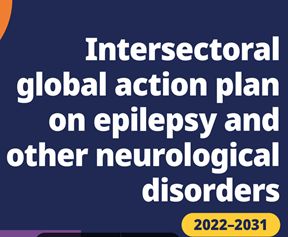Markus Reuber, доктор медичних наук, професор, Академічне відділення неврології, університет Шеффілда, Королівська лікарня Халламшира, Glossop Road, Sheffield, S10 2JF
У 2005 році МПЕЛ визначила епілепсію як «розлад мозку, що характеризується стійкою схильністю до виникнення епілептичних нападів, а також нейробіологічними, когнітивними, психологічними та соціальними наслідками цього стану». (1). Хоча епілепсія не визнається повністю як комплексне нейробіологічне захворювання головного мозку, при якому розвитку нападів часто передують когнітивні, психологічні або психіатричні симптоми (2), це визначення епілепсії охоплює найважливіші наслідки епілепсії, не пов'язані з нападами, які принаймні для тих людей, у яких епілептичні напади не можуть бути повністю куповані за допомогою лікування, мають більший вплив на якість життя, пов'язане зі здоров'ям, ніж частота або тяжкість нападів власними силами. (3).
У визначенні епілепсії МПЕЛ 2014 відсутні будь-які згадки про прояви епілепсії, не пов'язані з нападами. В даний час епілепсія визначається як «захворювання головного мозку, що визначається ... принаймні двома неспровокованими (або рефлекторними) нападами, що відбуваються з інтервалом >24 годин, ... одним неспровокованим (або рефлекторним) нападом і ймовірністю подальших нападів, аналогічною загальному ризику рецидиву (не менше 60%) після двох неспровокованих нападів, що відбуваються протягом наступних 10 років… [або] діагнозом синдрому епілепсії». (4).
Відсутність згадки про нейробіологічні, когнітивні, психологічні та соціальні аспекти цього багатогранного захворювання викликає особливий жаль, оскільки (як зазначають автори визначення 2014 року) «визначення епілепсії впливатиме на діагностику та лікування як у багатих ресурсами, так і в бідних ресурсами країнах». Не характеризуючи епілепсію ширше як складне нейропсихіатричне захворювання та обмежуючись нападами, визначення 2014 року є втраченою нагодою для людей з епілепсією та для клініцистів, зацікавлених у наданні комплексного лікування, спрямованого на покращення якості життя пацієнтів, а не просто на зменшення нападів».
Мій вибір як редактора з поточного журналу «Seizure» – це проспективне клінічне дослідження Rui Zhong та ін., в якому вивчалися предиктори розвитку медикаментозно резистентної епілепсії, включаючи депресію та тривогу, у пацієнтів з нападами на момент постановки діагнозу епілепсії (5). Підтверджуючи результати попереднього дослідження (6), у цій роботі показано, що наявність депресії на момент встановлення діагнозу епілепсії втричі підвищує ймовірність того, що напади виявляться резистентними до лікарських препаратів. Пацієнти з депресією та тривогою на момент постановки діагнозу в п'ять раз частіше не відповідали на протиепілептичні препарати, ніж пацієнти, які не мали жодного з цих поширених «коморбідностей» епілепсії.
Ця стаття має допомогти зробити майбутні моделі прогнозування медикаментозно-резистентної епілепсії більш точними та сприяти більш ранньому розгляду таких методів лікування, як хірургічне лікування епілепсії. Можливо, ця стаття також переконає більше клініцистів оцінювати психічне здоров'я своїх пацієнтів із нападами та підвищить ймовірність того, що наступне визначення епілепсії МПЕЛ визнає помилковість зведення епілепсії до захворювання, що характеризується нападами, і натомість повністю охоплюватиме всі аспекти епілепсії (з нападами або без нападів), включаючи двонаправлений зв'язок між нападами, психічним здоров'ям, когнітивними та соціальними проблемами. І останнє, але не менш важливе: ця стаття може спонукати дослідників до вивчення питання про те, чи може терапія депресії та тривоги на етапі діагностики епілепсії покращити результати протиепілептичного лікування.
Література
- Fisher RS, van Emde Boas W, Blume W, Elger C, Genton P, Lee P, Engel J Jr. Epileptic seizures and epilepsy: definitions proposed by the International League Against Epilepsy (ILAE) and the International Bureau for Epilepsy (IBE). Epilepsia. 2005;46:470-2.
- Hesdorffer DC, Ishihara L, Mynepalli L, Webb DJ, Weil J, Hauser WA. Epilepsy, suicidality, and psychiatric disorders: a bidirectional association. Ann Neurol. 2012;72:184-91.
- Rawlings GH, Brown I, Reuber M. Predictors of health-related quality of life in patients with epilepsy and psychogenic nonepileptic seizures. Epilepsy Behav. 2017;68:153-158.
- Fisher RS, Acevedo C, Arzimanoglou A, Bogacz A, Cross JH, Elger CE, Engel J Jr, Forsgren L, French JA, Glynn M, Hesdorffer DC, Lee BI, Mathern GW, Moshé SL, Perucca E, Scheffer IE, Tomson T, Watanabe M, Wiebe S. ILAE official report: a practical clinical definition of epilepsy. Epilepsia. 2014;55:475-82.
- Zhong R, Chen Q, Li N, Zhang X, Lin W. Psychiatric symptoms predict drug-resistant epilepsy in newly treated patients. Seizure 2022, please add bibliographic details.
- Hitiris N, Mohanraj R, Norrie J, Sills GJ, Brodie MJ. Predictors of pharmacoresistant epilepsy. Epilepsy Res. 2007;75:192-6.
Markus Reuber MD PhD, Academic Neurology Unit, University of Sheffield, Royal Hallamshire Hospital, Glossop Road, Sheffield, S10 2JF
In 2005 the ILAE defined epilepsy as “a disorder of the brain characterized by an enduring predisposition to generate epileptic seizures, and by the neurobiologic, cognitive, psychological, and social consequences of this condition” (1). While not fully recognising epilepsy as a complex neurobiological disorder of the brain in which the development of seizures is often preceded by cognitive, psychological or psychiatric symptoms (2), this definition of epilepsy did embrace the most important non-seizure sequelae of epilepsy which, at least for those individuals whose epileptic seizures cannot be stopped completely with treatment, have greater effects on health-related quality of life than seizure frequency or severity itself (3).
The 2014 ILAE definition of epilepsy dropped any reference to non-seizure manifestations of epilepsy. Epilepsy is currently defined as “a disease of the brain defined by … at least two unprovoked (or reflex) seizures occurring >24 h apart, …one unprovoked (or reflex) seizure and a probability of further seizures similar to the general recurrence risk (at least 60%) after two unprovoked seizures, occurring over the next 10 years … [or the] diagnosis of an epilepsy syndrome” (4).
The failure to mention the neurobiologic, cognitive, psychological, and social aspects of this multifaceted disease is particularly regrettable because (as the authors of the 2014 definition point out) “the definition of epilepsy will affect diagnosis and treatment in both resource-rich and resource-poor societies”. By not characterising epilepsy more broadly as a complex neuropsychiatric disease and by restricting the focus on seizures, the 2014 definition represents a missed opportunity for individuals with epilepsy and for clinicians interested in offering a holistic treatment service aiming to improve patients’ quality of life rather than simply reducing their seizures.
My Editor’s Choice from the current volume of Seizure is a prospective clinical study by Rui Zhong et al. exploring predictors of the development of drug resistant epilepsy – including depression and anxiety - in patients newly presenting with seizures at the time of their epilepsy diagnosis (5). Confirming the findings of a previous study (6), this paper demonstrates that the presence of depression at the point of diagnosis of epilepsy makes it three times more likely that the seizure disorder will prove drug resistant. Patients with depression and anxiety at diagnosis were five times more likely not to respond readily to antiseizure medication than patients with neither of these common “comorbidities” of epilepsy.
This paper should help to make future prediction models of drug resistant epilepsy more accurate and facilitate an earlier consideration of treatments such as epilepsy surgery. Perhaps this paper will also persuade more clinicians to assess the mental health of their patients with seizures and make it more likely that the next ILAE definition of epilepsy will recognise the fallacy of reducing epilepsy to a disease characterised by seizures, and that it will instead fully embrace all aspects of epilepsy (seizure and non-seizure), including the bidirectional relationship between seizures, mental health, cognitive and social problems. Last but not least: This paper may motivate researchers to study whether tackling depression and anxiety therapeutically at the point of epilepsy diagnosis can improve antiseizure treatment outcomes.
References
- Fisher RS, van Emde Boas W, Blume W, Elger C, Genton P, Lee P, Engel J Jr. Epileptic seizures and epilepsy: definitions proposed by the International League Against Epilepsy (ILAE) and the International Bureau for Epilepsy (IBE). Epilepsia. 2005;46:470-2.
- Hesdorffer DC, Ishihara L, Mynepalli L, Webb DJ, Weil J, Hauser WA. Epilepsy, suicidality, and psychiatric disorders: a bidirectional association. Ann Neurol. 2012;72:184-91.
- Rawlings GH, Brown I, Reuber M. Predictors of health-related quality of life in patients with epilepsy and psychogenic nonepileptic seizures. Epilepsy Behav. 2017;68:153-158.
- Fisher RS, Acevedo C, Arzimanoglou A, Bogacz A, Cross JH, Elger CE, Engel J Jr, Forsgren L, French JA, Glynn M, Hesdorffer DC, Lee BI, Mathern GW, Moshé SL, Perucca E, Scheffer IE, Tomson T, Watanabe M, Wiebe S. ILAE official report: a practical clinical definition of epilepsy. Epilepsia. 2014;55:475-82.
- Zhong R, Chen Q, Li N, Zhang X, Lin W. Psychiatric symptoms predict drug-resistant epilepsy in newly treated patients. Seizure 2022, please add bibliographic details.
Hitiris N, Mohanraj R, Norrie J, Sills GJ, Brodie MJ. Predictors of pharmacoresistant epilepsy. Epilepsy Res. 2007;75:192-6.





